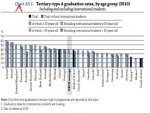You are right about the regulations! But, product-safety regulations are often necessary to save lives. Of course, that's of little concern to you - isn't it? It's all aboud da muney, isn't it?
What's most important, given the type of production, is that they BE less costly. Productivity has little to do with it. Tiny, nimble fingers in China are "productive" because they cost less to slap-together smartphones. But, invent a machine that does (the "slapping together") for a tenth of their hideously low salaries, and the Chinese manufacturers will buy your product! (Btw, Chinese engineers are already working on said automated machinery.)
So, at present, because you have a lower standard-of-living then, ipso facto, you have lower production-costs, labor-costs being a key ingredient. Europe teaches the lesson that at first this helps, but as the standard of living increases (as it did after the total destruction of WW2) as a factor this reverses itself. It makes countries less competitive. The US and EU are prime examples.
In the EU, the French workers are up-in-arms that Polish workers can legally work in France for half their salaries - typically on construction-sites.
My point: There is nothing we can do about the phenomenon of lower labor-production costs than bear with it:
*There is not that much automation in the construction industry. (Except in preparing batch-concrete in a timely manner. Concrete goes hard if you don't use it right away.)
*Where there is automation, American industries are employing the newest technologies. In this manner, they are going to take back a lot of nimble-finger jobs that fled to the Far East. (Let us hope, there is no reason American industry cannot achieve that goal -
if we have educated people who know how to develop and run such automated production lines.)
*Thus, as I am ever fond of repeating in this forum,
American jobs are going up-market since we are heavily a Services Oriented economy. (Nearly 80% of GDP is accounted for by services-industries of one form or another. See the breakdown
here.)
*An economy of Services-industries requires a higher level of skills/competencies (aka "intelligence") than in the past.
And, as I am fond of repeating at present (since it just happened) -
we, as a nation, have just stoopidly shot ourselves in the foot by failing to install Hillary as PotUS who would have implemented a program to assure Tertiary Education free-for-all-comers ...


